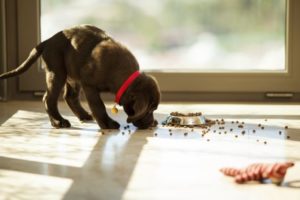
Often cats and dogs can be curious animals and end up ingesting various foreign bodies that they shouldn’t, resulting in intestinal obstructions.
Often cats and dogs can be curious animals and end up ingesting various foreign bodies that they shouldn’t, resulting in intestinal obstructions. Intestinal obstructions often occur in cats and dogs when they consume foreign objects that can’t pass through their gastrointestinal tract, becoming lodged in their esophagus, stomach, intestinal tract, or even under their tongue. Continue reading to identify the signs/symptoms, diagnosis, and treatment of intestinal obstructions in your cat and dog.
Signs/Symptoms
The clinical signs linked to intestinal obstructions in pets can vary from no signs to serious issues based on the obstruction’s size, location, and duration. Listed below are some of the symptoms shown by cats and dogs after ingesting a foreign object:
- Nausea
- Vomiting
- Diarrhea
- Loss of appetite
- Abdominal pain/swelling
- Dehydration
- Lethargy
- Constipation
- Bloody stool
Diagnosis
When it comes to diagnosing intestinal obstructions in cats and dogs, the first things considered are the signs/symptoms and history of the possibly ingested foreign object. Then our veterinarians will perform an abdominal palpation, meaning we’ll be feeling around your pet’s abdominal wall to identify the size and location of the object. If it’s too difficult to identify the object through the palpation, the next necessary step would be an x-ray of your pet’s abdomen to confirm the object’s presence. Not all materials show up clearly on a radiograph and sometimes an ultrasound can be necessary to definitively
diagnose your pet with a foreign body.
Treatment
The best treatment for intestinal obstructions in your pet is prevention, helping reduce the risk of your pet ingesting foreign objects that can be harmful to their health. However, if your pet ingests a foreign object that is too large or can’t pass on its own accord, surgery or other treatment options will be used based on your pet’s symptoms and the size and location of the object to remove the foreign object from your pet’s abdomen.
Common Dog Foreign Bodies
- Clothing items (Especially socks and underwear)
- Bones
- Sticks
- Rocks/Stones
- Toys
- Coins
- Plastic
- Rubber items
Common Cat Foreign Bodies
- Thread/String
- Wool
- Paper
- Plastic
- Elastics
- Plants
- Toys
- Hair
If you think your cat or dog has swallowed a foreign object, contact Mount Carmel Animal Hospital immediately to ensure your pet receives the proper care.
Here at Mount Carmel Animal Hospital, We’ll Treat Your Pets Like Family!
Mount Carmel Animal Hospital has been serving the Northern Baltimore/Southern York community for over 30 years and is proud to be an independently operated, small animal practice committed to excellence in veterinary medicine and client service. From grooming to wellness services, along with Canine Life Skills Training Courses, and surgical procedures, we have the expertise that will best serve the needs of you and your pet. Contact us at 410-343-0200 and follow us on Facebook!
